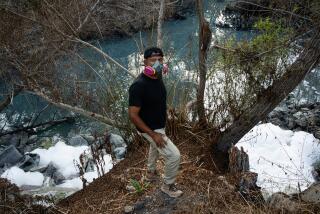NAFTA Panel Finds a Mess, Can’t Clean It
- Share via
A new report by a three-nation NAFTA panel has concluded that the site of an abandoned battery-recycling plant in Tijuana remains polluted eight years after the operation was closed down.
But the report stops short of assigning blame or recommending a cleanup strategy.
As a result, environmentalists are branding it a tepid document and a symbol of NAFTA’s impotence when it comes to upholding environmental standards that were enacted alongside the North American Free Trade Agreement nearly a decade ago.
To its neighbors, the abandoned lead smelter, called Metales y Derivados, remains a toxin-laden eyesore and a potential health hazard.
“We’ve exhausted all the venues--all possible venues for the cleanup,” said Cesar Luna, an attorney for the San Diego-based Environmental Health Coalition, which in 1998 joined a Tijuana group in filing a complaint against Mexico under NAFTA-related provisions.
“Now we have independent recognition ... that this poses harm. But it’s a toothless report.”
The report, issued by the North American Commission for Environmental Cooperation, concluded that although health risks have not been determined with certainty, experts who studied the case saw an urgent need to clean the site to prevent the spread of pollutants that include lead, arsenic, cadmium and antimony.
But the report, known formally as a factual record, said its purpose was not to point blame or suggest corrective action.
The 154-page report “is not to render judgment on whether a party has failed to comply with its obligations,” said Carla Sbert, legal officer of the Commission for Environmental Cooperation unit that receives such complaints. “The purpose is to shed light on all the aspects of an issue.”
She added, however, that such findings could serve as the basis for later reforms.
The commission is made up of representatives from the three NAFTA countries: the United States, Mexico and Canada. The body was set up to address environmental concerns surrounding the projected increase in commerce as a result of the 1994 free-trade accord.
Among the safeguards is a complaint process under which citizen groups can accuse any of the three countries of flouting environmental laws. The complaint by the San Diego organization and a group representing families who live near the former plant was the first along the U.S.-Mexico border.
Luna said the groups are evaluating what more to do to force the cleanup of the plant, which has remained littered with spent battery casings, rusted barrels and piles of lead-tainted dirt since being closed by Mexican authorities in 1994.
Mexican officials cited and issued an arrest warrant for the former owner, Jose Kahn, who lives in San Diego. The statute of limitations on those charges expired in 1999, Mexican officials said.
Kahn once pleaded guilty in Los Angeles to charges of illegally transporting hazardous material. He was fined $50,000 and agreed to take steps to clean up the site.
“We don’t have any recourse other than to do community organizing and protest,” Luna said.
The groups said Mexico failed to enforce its hazardous-waste laws and did little to keep pollutants from leaking from the site, perched on Tijuana’s industrial east side above a neighborhood of about 1,000 families.
Mexican officials said they have sought to handle the problem, first by closing the plant and later by building a wall and covering the waste piles with tarps to keep people away from the pollutants.
Sbert said it has not been decided whether Mexican law requires the government to clean the site. “It’s an open question,” she said.
Cash-strapped Mexico does not have a federally funded system for cleaning up toxic sites similar to the Superfund program in the United States. Some advocates have suggested that the U.S. government help Mexico clean the site, which the petitioners said contains 6,000 metric tons of lead slag, plus other debris.
Mark Spalding, who teaches international environmental law at UC San Diego and participated in negotiations over the NAFTA safeguards, agreed that the Metales y Derivados case highlights shortcomings in the provisions.
Spalding said he and other environmental advocates had sought to give the Commission for Environmental Cooperation stronger enforcement powers, such as subpoena authority.
But he said the resulting accord, over which environmentalists were divided, was the best that activists could achieve at the time. The San Diego group “is absolutely right that this institution is lacking in teeth. But it is the result of politics,” Spalding said.
More to Read
Sign up for Essential California
The most important California stories and recommendations in your inbox every morning.
You may occasionally receive promotional content from the Los Angeles Times.










